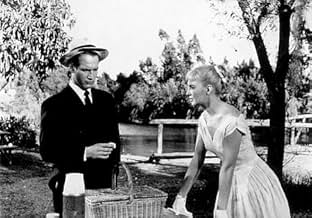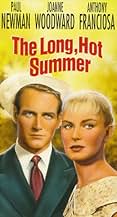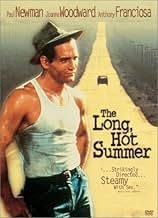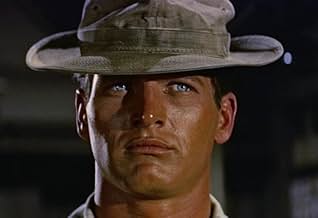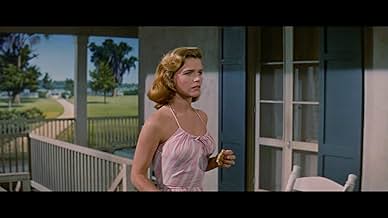Il truffatore Ben Quick, accusato di aver bruciato dei fienili, arriva in una piccola città del Mississippi e velocemente si insidia nella famiglia più ricca della città, i Varner.Il truffatore Ben Quick, accusato di aver bruciato dei fienili, arriva in una piccola città del Mississippi e velocemente si insidia nella famiglia più ricca della città, i Varner.Il truffatore Ben Quick, accusato di aver bruciato dei fienili, arriva in una piccola città del Mississippi e velocemente si insidia nella famiglia più ricca della città, i Varner.
- Premi
- 2 vittorie e 4 candidature totali
- Lucius
- (as William Walker)
- Ambulance Driver
- (non citato nei titoli originali)
- Man at Auction
- (non citato nei titoli originali)
- Man at Auction
- (non citato nei titoli originali)
- Man at Auction
- (non citato nei titoli originali)
- Linus Olds
- (non citato nei titoli originali)
- Woman at Auction
- (non citato nei titoli originali)
Trama
Lo sapevi?
- QuizDirector Martin Ritt was forever known after this movie as the man who tamed Orson Welles. During filming, Ritt drove Welles to a local swamp, kicked him out of the car and forced him to find his own way back.
- BlooperWhen Clara tells Ben off at the picnic, there is smoke wafting through the shot, apparently from cigarettes or cigars smoked by the director and/or crew.
- Citazioni
Clara: Mr. Quick, I am a human being. Do you know what that means? It means I set a price on myself: a high, high price. You may be surprised to know it, but I've got quite a lot to give. I've got things I've been saving up my whole life. Things like love and understanding and-and jokes and good times and good cooking. I'm prepared to be the Queen of Sheba for some lucky man, or at the very least the best wife that any man could hope for. Now, that's my human history and it's not going to be bought and sold and it's certainly not gonna be given away to any passin' stranger.
- ConnessioniEdited into The Greatest Showman (2017)
Although the plot is definitely familiar territory, and the script errs fairly strongly on the affected style customary to the post-Actors Studio era, the story resonates truthfully and remains engaging throughout, while the alluring undercurrent of barely-bridled sexuality keeps the proceedings energetic and urgent. Ritt's direction is taut but unfussy, allowing the inherent claustrophobia and tension of the film's small-town setting to speak for itself, and the sumptuous Technicolor cinematography is so crisp you can practically smell the marsh and sweat from the Mississippi bayou (and I'm not even just talking about Orson Welles). Although the climax feels like a somewhat forced attempt to escalate the stakes simmering throughout, with an overly hasty resolution to boot, the buildup is calm and confident enough to make the viewing experience worth its while without having to fight to engage its audience.
Naturally, like the majority of its contemporaries, the story ultimately exists as a vehicle to foreground the performances of the cast, who are what ultimately make the film worthwhile. Paul Newman, cementing his iconic identity as the shrewd, laconic, effortlessly cool drifter, crackles with charisma as accused arsonist Ben Quick, magnetic throughout even before his surprisingly racy shirtless scene. Joanne Woodward gives arguably the film's strongest performance as the controversially unmarried Clara Varner, practically vibrating in place from a lifetime of feeling discounted and under-appreciated. Rather than playing up her predicament, however, Woodward embodies Clara with a steely confidence, which is altogether more effective and appealing. In contrast, Orson Welles delivers the film's most legendarily outlandish performance as the resident belligerent patriarch. Notoriously mocking the Actors' Studio by mumbling almost incomprehensibly through his cartoonish southern drawl, the vociferous Welles is skilled enough to steal scenes in his sleep (which he may well have been during certain scenes), outrageously fun when hamming it up, with occasional pockets of surprising solemnity and depth, as if coming up for air from his customary grunting and snorting. Anthony Franciosa is also a sturdy presence, even if he does occasionally overindulge in Method hand-wringing and hysteria, while a cameo from the delightful Angela Lansbury as Welles' cheerily aggressive suitor adds a dash of comedic perfection.
While it may fall short of the acerbic intensity of similar fare such as Cat on a Hot Tin Roof, The Long, Hot Summer still serves a healthy slice of all the smouldering, robustly acted 1950s melodrama you could ask for. If only for the incandescent interplay between Newman and Woodward, with the added pleasure of cartoon-character Welles, the film is easily worth sinking into, on a dozy, hot summer evening or otherwise.
-7/10
I più visti
Dettagli
- Data di uscita
- Paese di origine
- Lingua
- Celebre anche come
- The Long, Hot Summer
- Luoghi delle riprese
- Clinton, Louisiana, Stati Uniti(town: Frenchman's Bend)
- Azienda produttrice
- Vedi altri crediti dell’azienda su IMDbPro
Botteghino
- Budget
- 1.500.000 USD (previsto)
- Tempo di esecuzione1 ora 55 minuti
- Colore
- Proporzioni
- 2.35 : 1
Contribuisci a questa pagina



